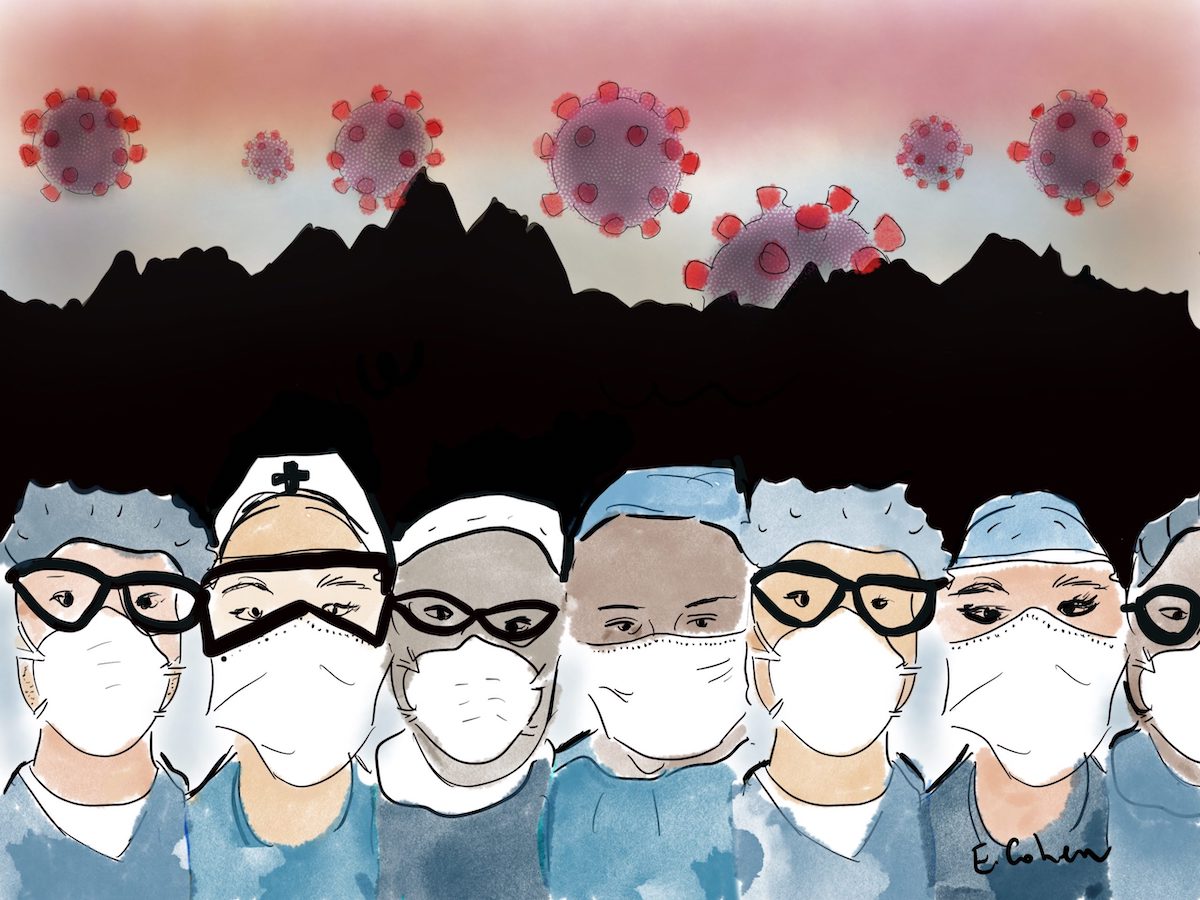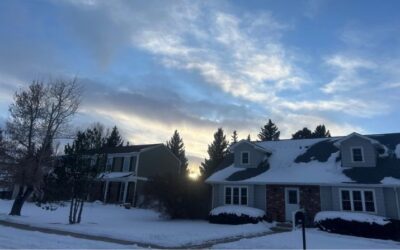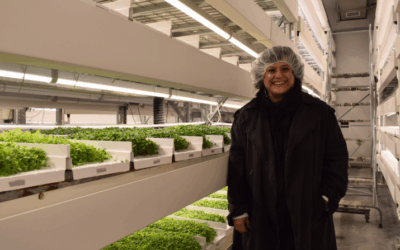This is the first installment of “On the Front Lines”—a KHOL original series examining life for people on the front lines of the COVID-19 pandemic.
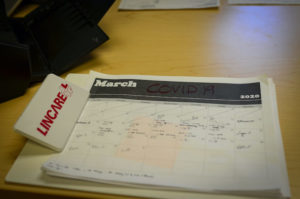
Katie Abbott has scrawled on her desk calendar the letters and numbers on everyone’s mind: COVID 19. (Robyn Vincent)
Unprecedented. Firestorm. Running without a playbook. That’s how the medical community is describing COVID-19 as they put in countless hours to protect and inform the valley in the face of a global pandemic.
“Every moment of the day is something in the back of your mind saying that there’s something going on with COVID-19,” Katie Abbott said. “Every moment you’re trying to make sure that you’re not missing something.”
As the administrative director of St. John’s Health home health and hospice care, Abbott acts as an in-between for physicians, who decide through a telehealth visit that a patient qualifies for a test, and home health clinicians, who go to the patient’s house and swab their nostrils for DNA.
Then, Abbott came down with a fever and a cough. Roles switched—from test coordinator to being tested herself. Luckily, it came back negative. But quarantining for three days with her family while she waited for results wasn’t easy, and hospital CEO Dr. Paul Beaupre told KHOL Wednesday that 50 Jacksonites have waited seven days now and still don’t have results.
“It’s a relief, no matter what, when you get it back and you find out that it wasn’t anything more serious,” Abbott said. “But it is definitely a roller coaster. You’re dealing with the idea of you know, I’m doing the best that I can for my community and for my family, but I could be exposed and I could be taking it home to my family.” Meanwhile, they have to understand that “living with and being a family member with a health care provider, that’s a risk.”
Beaupre said he too is worried about bringing the virus home to his family.
“I carefully come in the door and before I say hello to anybody, I wash my hands and I wash my face and then I interact with the family after that,” he said.
Daily Adaptation
Pediatrician and county health officer Dr. Travis Riddell says he’s “fortunate to get to wear many hats in this community, which I suppose is one of the nice things about living in a small town.”
By far the biggest hat he’s wearing right now is his public job. Usually he works on important but less pressing things than a global pandemic—rabies transmission, opioid abuse and youth pregnancy. Last week he issued a sweeping emergency health order that closed scores of businesses.
“It’s become a much more urgent and time-consuming job over time,” Riddell said. “But that’s obviously the response that’s needed these days.”
Like many working parents, Riddell and his wife are also trying to homeschool their young children. Medical partners are picking up some of his usual pediatric duties to help out as life goes on amid a pandemic.
“We’re still seeing kids get everything from dog bites to diarrhea,” Riddell said. “There are still kids out there that are getting hit by cars, there are still babies that need to be resuscitated after they’ve been born at three in the morning.”
Every day is different for providers at the forefront of the pandemic. ER doctor Dan Nelson (who also happens to be a KHOL volunteer DJ) said his 12-hour emergency medicine shifts always vary based on who walks in the door. People are largely following protocol and calling their providers if they have coronavirus symptoms, but COVID-19 guidelines are changing hour by hour, day by day, Nelson said. The World Health Organization and the Centers for Disease Control and Prevention aren’t always on the same page, for example, about what type of mask to where and how the virus can spread.
“That makes it a little tricky,” Nelson said. “Catching up on everything at the beginning of the shift, every time we come in, is different.”
Abbott’s in the same boat.
“There really isn’t an average day,” she said. “It’s like a firestorm. You turn around and there is a fire here that needs to be taken care of. Once that’s taken care of you turn around and you find another one.”
One of her colleagues, Inna Counts, volunteered to be trained in sample collection to help out and so far has done two. Counts usually does mostly office work in her role as a clinical manager.
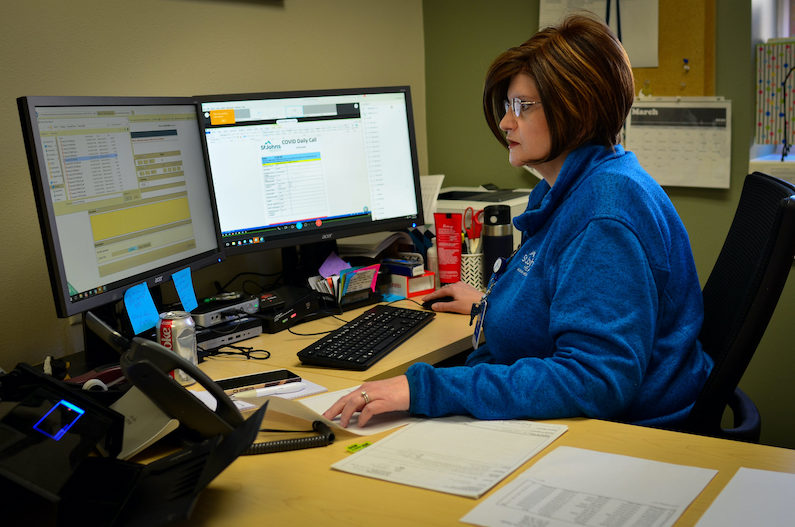
Katie Abbott, administrative director of St. John’s Health home health and hospice care, juggles logistical puzzles to get patients the care they need during the COVID-19 pandemic. “Every moment you’re trying to make sure you’re not missing something.” (Robyn Vincent)
“Of course I had a little bit of anxiety, there was a little bit nervous,” Counts said. “But I think having training before going in to do it helped a lot. It’s a pretty easy test and we have good equipment. Swabs are very soft, it’s not like you’re hurting somebody. It’s pretty easy to do. And we have protective equipment so I wasn’t worried about that part.”
Dr. Jim Little Jr. is one of the St. John’s Health physicians providing care over online video visits. He also runs the hospital’s Urgent Care clinic in the Smith’s plaza. He’s chatted with people who are sick and have a fever or cough to determine whether or not they need to be tested for COVID-19 and he’s also moved about two-thirds of his visits online—as many normal patients as possible, and those who are especially at risk, like people over 65 or with underlying medical problems.
Face-to-face interactions are often the bread and butter of family medicine, and the shift from seeing patients in a room to seeing them over a computer screen is a big one for providers.
“A key part of my relationship with my patients is kind of high-touch, in-person, interpersonal interaction,” Little Jr. said. “And to suddenly have to do that on a computer screen is definitely a change in how we’ve done things and how we’re going to do them going forward.”
Managing Emotions
Riddell said the support and love he’s gotten as he’s had to make tough decisions is helping make his job, and his life, “a heck of a lot easier.” But that doesn’t change other feelings in the front of his mind.
“This is uncharted territory,” he said. “Unless there are folks out there listening to this who were alive in 1917 and 1918, none of us have experience dealing with this. There’s a lot of unknown and a lot of uncertainty. We don’t know how bad this is going to be. I think that we can all anticipate knowing people who we are going to lose as part of this outbreak. If that doesn’t scare you, you’re not paying attention.”
Nelson feels an added layer of frustration as a doctor who likes to make sick people better.
“We often do feel helpless when we deal with problems like this because it’s not something we can necessarily fix,” he said. “Certainly we can treat people that get sick in certain ways and support their ability to breathe, which is the main issue in this particular virus as to respiratory problems. But, you know, in terms of providing a cure, and a solution, which is what we love to do as physicians, you know, we just don’t have that ability.”
He’s been trying a “media cleanse” when he gets home from work to limit his exposure to bad news and keep his mental health in check.
“New hobbies is a good thing, just trying to not get sucked into just refreshing all of your media on a nonstop basis,” Nelson said. “That cycle of anxiety tends to build and it’s very difficult to break.”
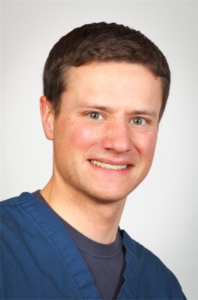
ER doctor Dan Nelson says he loves finding solutions for his patients, ways to help them heal, but COVID-19 has left him with few such options. (Courtesy photo)
He’s also trying to quit being a ”Monday morning quarterback” and encourages others to do the same, “as opposed to stomping our feet and banging our hands on the table and getting constantly angry and frustrated and playing the blame game.”
Meditation and exercise are helping Beaupre clear his head from the more than 300 texts and emails he’s receiving on a daily basis. He’s also trying to keep fear under control in the hospital by reminding his employees they’re “heroes” who have trained for pandemics before. Meanwhile, he suggests community members view this crisis through an honest lens.
“I’m just encouraging people not to take the cowboy approach to this and just buck up and go through it, but to talk about it,” Beaupre said. “Talk about what’s concerning them and get it out on the table.”
Little Jr. is trying to see this time as an opportunity to dig up home improvement projects that have been collecting dust as well as acquiring new skills in the kitchen.
“I’ve been trying to learn to be a better cook and make some homemade pasta and cook some bread and do things I wouldn’t have done otherwise,” he said.
A Local, National Conversation
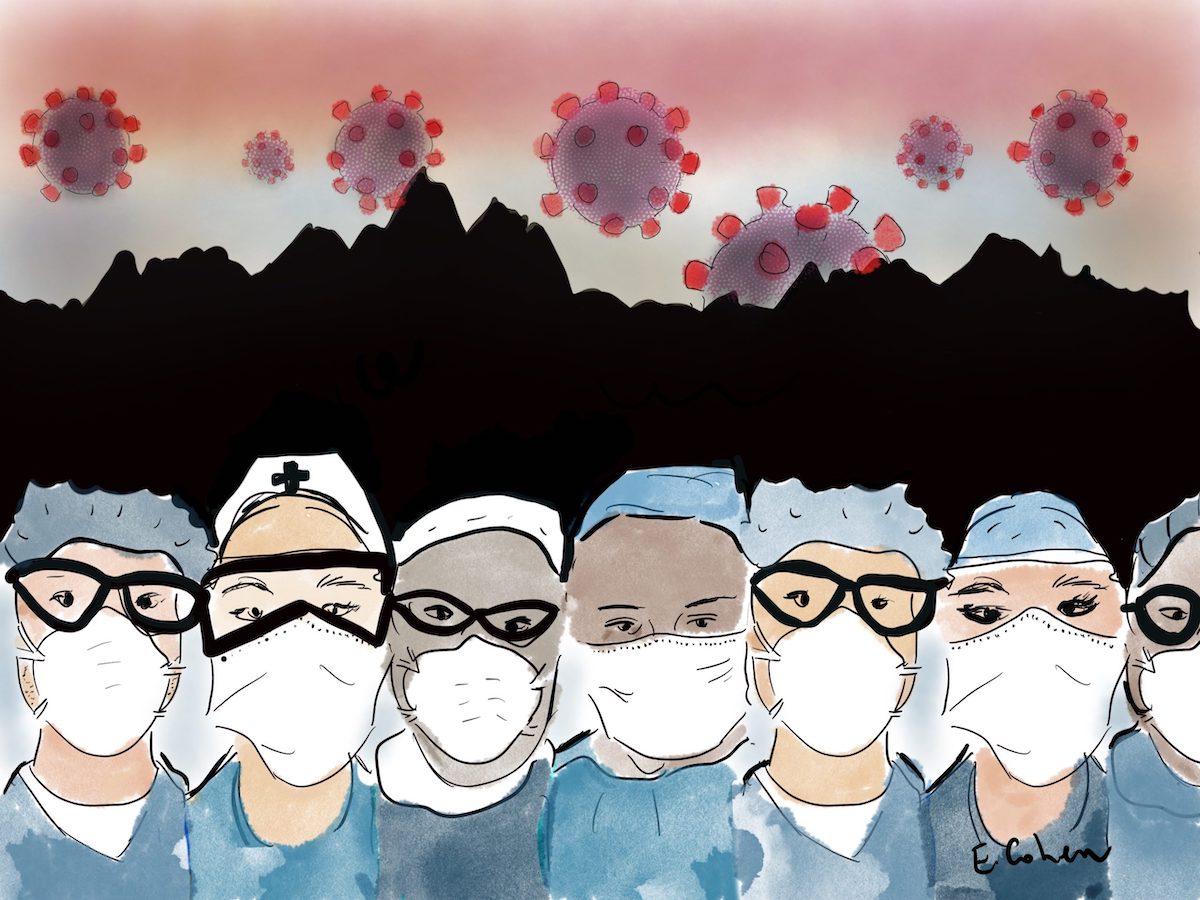
One message health care providers have for Jackson residents about the pandemic: your behavior could have unintended consequences on your neighbors. (Emily Cohen)
Those on the front lines overwhelmingly praised Teton County government and public health officials for taking COVID-19 seriously. Officials canceled events, limited gatherings and closed businesses before the first case was reported on March 18. Now health care workers say it’s important for the public to keep their guard up and think about the health of the herd.
“I think that sometimes the young healthy Jackson Hole average population kind of thinks they’re invincible,” Little Jr. said. “That’s not always the case. But it’s not always you that we’re worried about. It’s often the people around you.”
As closures continue—first schools and ski hills, then restaurants and bars, now national parks—those on the front lines are urging folks to not lose resolve.
“I think people need to stay on top of it,” Nelson said. “What I’ve noticed is that there’s already a call for backing off on some restrictions. And we’re not even at the start of this. We’re barely at the start of this.”
Riddell is thinking a lot about what it means to balance harm.
“There are huge consequences to both doing too little and doing too much,” he said. “I think that we need to have an ongoing dialogue as a community and as a society about how to find that balance. I always sort of fall back on my medical training when I think about these sorts of things. And you know, as a physician, I’ve sworn to the Hippocratic oath, first, do no harm.”
He compared the pandemic response to treating a cancer patient.
“When someone has a tumor, the treatment is extremely toxic medicine that is very specifically designed to kill human cells,” Riddell said. “And so both the treatment and not treating the patient are harmful and then finding the balance is very tricky. With that cancer patient, we have the benefit of having a lot of past experience and a lot of research to determine where that balance is. With COVID-19 we have much less research, much less experience.”
Medical professionals in Teton County are watching what’s unfolding nationally. Abbott said she wishes for more uniformity state to state.
“When it comes to social distancing and the level of self-isolation, it would be nice if we had more continuity to the message,” Abbott said.
There’s room for improvement in testing turnaround time too.
“There’s definitely been a lot of really unacceptable delays in testing and availability of testing,” Little. Jr. said. “I think that a lot of the decisions that have been made at the federal level have been frustrating to watch in terms of the delays. Where I think the best response has been at the state and local levels, because that’s where I really see people doing some innovative things.”
For now, valley residents are best off continuing to follow the rules when it comes to hand washing, social distancing and more. Other than that, medical professionals say, they can sleep easy knowing their neighbors are hard at work.
“Go to bed knowing that there are some amazing people out there doing the best that they can to protect the community,” Abbott said.
Count on KHOL for vital coverage during this unprecedented time.Your support ensures the future of this essential community service. Become a member today.

